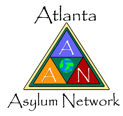| |



















|
|
 |
|
|
|
 |
|
|
The Atlanta Asylum Network relies upon volunteers (especially Emory student volunteers) to continue our services to asylum seekers. Volunteers have a
variety of opportunities to aid torture survivors and other individuals fleeing persecution. The majority of volunteers
assist by meeting with asylum seekers and coordinating physical and psychological evaluations. We have a number
of opportunities including training organization, outreach programs, and fundraising. Individuals interested in
volunteering should contact: humanrights@emory.edu. |
|
 |
|
|
|
|
Case Tracking Checklist
Lawyer/Asylum Seeker Intake Form
Intake Interview
World Health Organization Disability Assessment Scale
Guidelines for Health Professionals to Write Affidavits
Sample Physical Affidavit-A
Sample Physical Affidavit-B
Sample Psychological Affidavit
Guidelines for Writing Human Rights Reports
Confidentiality Agreements
Referral and Resources List for Clients
|
|
 |
|
|
|
|
|
While the Atlanta Asylum Network is deeply appreciative of all its volunteers, due to the sensitive nature
of our work, it is necessary to maintain a hierarchy of participation. Those volunteers with the most
experience and the greatest time commitment will be given the heaviest responsibilities but also the
greatest privileges. These volunteers schedule and conduct initial intake interviews, arrange medical evaluations, follow-up with clients, and oversee the managing of cases assigned to them. They are also responsible for training volunteers with some experience by conducting interviews collaboratively, and
teaching them about writing narratives, tracking cases, following up with clients, etc. New volunteer members play a crucial role in the running of the Atlanta Asylum Network at the same time as gaining the experience and exposure required to work directly with clients. These volunteers are responsible for planning
events, planning our semi-annual training sessions, promoting the Atlanta Asylum Network in both the
Atlanta and Emory community, expanding our contact list of lawyers and health professionals, communicating with volunteers in the law school, medical school, school of public health, etc., and doing necessary research.
|
|
 |
|
|
|
|
As a volunteer handling an Asylum Network case, you are responsible for representing the Asylum Network to the asylum seeker, his/her lawyer, as well as the medical professional(s) involved in the case. Your duty
is to ensure that the medical and/or psychological evaluation(s) requested by the client’s lawyer are successfully completed.
After creating a new file, which includes the Asylum Network’s Intake Form and the client’s legal affidavit (Declaration), the first step is to contact the client to schedule an intake interview.
In an intake interview, we collect demographic information, ask for the client to describe the events for which he/she is seeking asylum, and give general information on his/her physical and emotional health.
We then conduct three questionnaires: the Hopkins Symptom checklist, the Post Traumatic Stress Syndrome Checklist, and the WHO Disability Assessment. These questionnaires give us information on the client’s mental and physical
health. This information must be compiled and typed up in a narrative to provide to the physician and/or psychologist.
The next step is to contact a physician, a psychiatrist/psychologist, or both, depending on the lawyer’s
request for that particular client. After physicians and psychologists have been identified, you need to arrange
evaluation dates, times, and locations. We hold evaluations at the DeKalb County Center for Trauma and
Torture Survivors. The evaluator(s) need to be provided with the client’s legal affidavit, your summary of the
intake interview, and a human rights report on the country in which the client was persecuted. Interpreters
should be arranged for prior to the evaluations as deemed necessary by the lawyer and client. Both the client
and medical professional(s) performing the evaluation(s) should be contacted again one day prior to the evaluation(s) as a reminder.
On occasion, we receive clients who are being held in a detention center while their case is pending. The same procedure must be followed in these cases with a few exceptions. First, when a client is in detention, it is not possible to hold an initial intake interview. Second, the client’s lawyer MUST accompany the medical professionals to the detention center to be allowed access to the client. For this reason, the evaluation must be scheduled with the attorney, and the attorney must verify that they will be granted access to the detention center on the day of the evaluation.
After the evaluation, it is the volunteer’s duty to ensure that both the lawyer and the Asylum Network receive a copy of the medical affidavit(s), verify that no further services are required, and to follow up on the case to record the outcome.
|
|
 |
|
|
|
|
Physicians for Human Rights Library
Physicians for Human Rights - Istanbul Protocol
Physicians for Human Rights - Examining Asylum Seekers
Asylum Law - International Consortium Aiding Asylum Seekers
Human Rights Tools
HIPAA Privacy Policies
|
|
|
|


